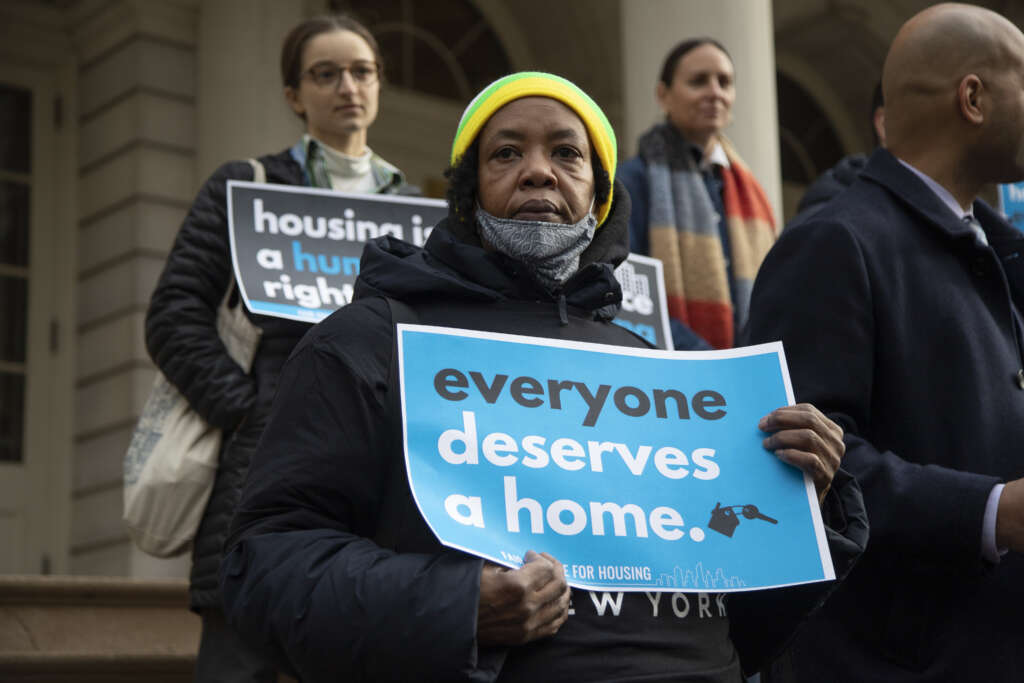
Opinion: Fair Chance for Housing Is Key to Justice and Public Health in NYC
“We’ve already received reports of denials based on conviction records, highlighting the urgent need for proactive education that a properly funded CCHR could provide.”
Councilmembers and advocates rally for the Fair Chance For Housing bill in December 2022. (John McCarten/NYC Council Media Unit)
New York City prides itself on being a beacon of progress, but a critical issue undermines our values: housing discrimination against people with conviction histories. The recently enacted Fair Chance for Housing Act (FCHA) was a bold step toward correcting this injustice, but its promise will be hollow without adequate funding for the New York City Commission on Human Rights (CCHR) to educate housing applicants about their new rights, inform housing providers about their new responsibilities, and enforce the law.
At The Fortune Society, where I serve as director of policy, we see firsthand the devastating consequences of housing discrimination. For 57 years, Fortune has been dedicated to providing alternatives to incarceration and supporting successful reentry. A staggering number of our participants — roughly a quarter — are homeless or housing insecure at the time of admission to our programs. We provide temporary housing and services to help them stabilize their lives. Yet, when they become ready to seek permanent housing, too many face outright rejection because of their past convictions.
Having spent 25 years in prison, I know this struggle. The FCHA is designed to protect individuals like me, and countless other New Yorkers, from this unfair barrier. The City Council recognized the pervasiveness of this discrimination when it overwhelmingly passed the FCHA. Now, it must ensure the CCHR has the resources to turn this law into a reality.
The CCHR is responsible for educating housing providers and applicants about the FCHA, processing complaints, mediating cases and, when necessary, litigating violations. Given past failures to comply with fair housing laws, we anticipate a significant need for enforcement. We’ve already received reports of denials based on conviction records, highlighting the urgent need for proactive education that a properly funded CCHR could provide. Without sufficient resources, the CCHR’s inability to effectively educate and enforce the FCHA will have dire consequences across several fronts:
Family justice: Housing discrimination perpetuates homelessness and destabilizes families, denying them opportunities for advancement. Over 750,000 city residents have conviction records, and a significant percentage of those released from state prisons end up in shelters. When housing is denied to an individual, their children are denied as well, hindering their chances for a better future.
Racial justice: The criminal justice system disproportionately impacts people of color. Eighty percent of New Yorkers with convictions are Black or Brown. Housing discrimination reinforces systemic barriers, traps communities in cycles of poverty and incarceration, and deprives them of opportunities to build wealth.
Public health: Stable housing is a social determinant of health. Without it, individuals face higher rates of chronic illness, mental health challenges and substance use disorders. These issues place a strain on our health care system and exacerbate existing vulnerabilities, especially for those with prior convictions. Denying housing forces individuals into unstable environments, increasing their risk of communicable diseases and mental health crises.
As coleaders of the Fair Chance for Housing Campaign, we have stepped in to fill the void left by the CCHR’s lack of resources, launching the “New Rights, New Beginnings” campaign to educate the public. However, our reach is limited. We cannot effectively educate private housing providers about their responsibilities under the FCHA.
What darkens the scenario this year is the federal government’s retreat from civil rights enforcement. This makes local action even more critical; the CCHR is now the primary line of defense against discrimination in our city.
We urge our City Council to increase the CCHR’s budget from $17 million to at least $21 million for the coming fiscal year. This will enable the commission to conduct comprehensive public education campaigns, hire more attorneys and investigators to handle complaints efficiently, and ensure that the FCHA truly provides a fair chance for housing.
Investing in the CCHR is not just about enforcing a law; it’s about investing in families, racial equity and public health. It’s about creating a more just and equitable New York City for all.
Reggie Chatman, MPH, is the director of policy at The Fortune Society’s David Rothenberg Center for Public Policy.
The post Opinion: Fair Chance for Housing Is Key to Justice and Public Health in NYC appeared first on City Limits.


